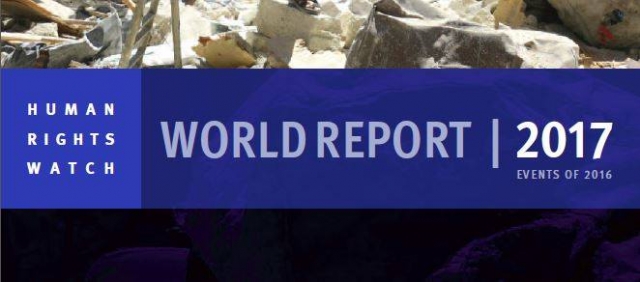Human Rights Watch Includes Georgia in Its 2017 World Report
Human Rights Watch (HRW), an American-founded international NGO that conducts research and advocacy on human right, has published its World Report 2017, subtitled “Demagogues Threaten Human Rights.” Key events from Georgia’s last year are mentioned inside.
The October 8th parliamentary elections, the state security service’s unfettered access to telecom operators’ networks I associated fears of a compromised right to privacy, the persisting lack of accountability concerning alleged abuses committed by law enforcement agencies, the restriction of media freedoms, and the rights of LGBT people were highlighted by HRW as the main events of 2016 in Georgia.
The NGO reports that parliamentary elections in Georgia, in which the ruling party Georgian Dream (GD) won an overwhelming victory, were assessed by international observers as being “competitive, well-administered and (generally respectful of) fundamental freedoms.”
However, they also noted procedural violations during the vote count in almost one-third of all polling stations and violent altercations in four.
“Local monitoring groups highlighted some cases of vote-buying, alleged political intimidation, and campaigning by unauthorized persons, but found these had no effect on the overall outcome,” the report reads.
The report also says that in April the Constitutional Court of Georgia ruled as unconstitutional legislation that allows state security services to have direct, unrestricted access to telecom operators’ networks to monitor communications, and ordered the authorities to reform surveillance regulations by March 2017. Legislation adopted in 2014 had imposed restrictions on surveillance operations by law enforcement, but left in place the security agencies’ operation of “black box” surveillance devices in telecommunications service providers’ networks. The court found this system allows mass collection of personal information in real time without effective oversight.
The leakage of some private conversations and videos, a highlight issue in the lead-up to the elections this year, found a place in the report, which also takes Georgia to task for not having an independent, effective mechanism for investigating crimes committed by law enforcement officials. In particular, the report relates that in July, the Georgian Young Lawyers’ Association (GYLA), a leading human rights group, published a report analyzing 22 cases they litigated in the past two years concerning alleged torture and ill-treatment by law enforcement officials.
The suicide of 22 year-old Demur Sturua in August was also included. The young man left behind a note accusing that a local policeman was coercing him to inform on local cannabis growers.
HRW says that several criminal cases against former officials have raised questions about selective justice and politically motivated prosecution here. The issue of whether marriage ought to be legally defined as the union between a man and a woman, raised by the GD and blocked by President Margvelashvili, made the list as well, as did the Rustavi 2 TV dispute, which is currently being considered by the Grand Chamber of the Supreme Court. The report says that this last dispute has “raised concerns about ongoing government interference with media.”
In the 687-page World Report, its 27th edition, Human Rights Watch reviews human rights practices in more than 90 countries.
By Thea Morrison












